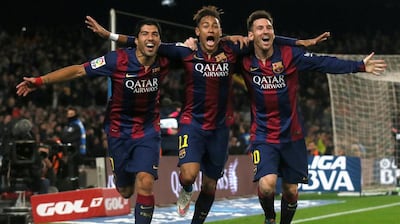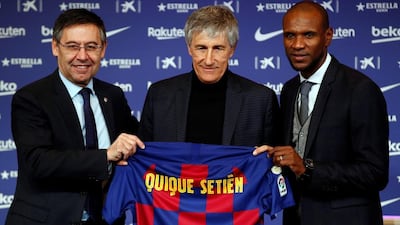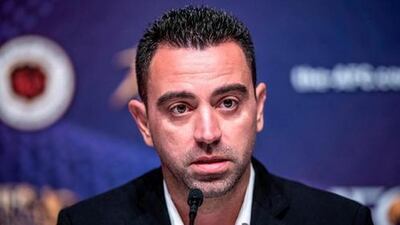Barcelona’s players soaked up the applause as they left Camp Nou in front of a sell out 96,708 crowd. It was April 16, 2019 and they had beaten Manchester United 3-0 after qualifying for a 12th consecutive Champions League quarter-final. Lionel Messi was at his routine best, Ashley Young and Jesse Lingard looks miles off the pace as the English team, who started the better of the pair, were easily outclassed.
Ernesto Valverde’s side were top of the domestic table and en route to an eighth La Liga title in 11 years, a league they would win by finishing 11 points ahead of Atletico Madrid, who they defeated a week before the United game at Old Trafford. Barca scored more goals, won more games and lost fewer than any Spanish team.
After that United game at Camp Nou Barca won four consecutive league matches and beat Liverpool 3-0 at home in the semi-final of the Champions League. Luis Suarez, Messi, Messi.
Suarez had hit form after a slow start to the season, Ivan Rakitic and Sergio Busquets were reliable in the middle, Arturo Vidal has been a pleasant surprise, Clement Lenglet too, with their influence on games tangible. The Brazilian Arthur looked a bargain and more like he had been raised at La Masia rather than Gremio in Brazil. Jordi Alba was linking well with Messi, Ousmane Dembele looked a threat, though Philippe Coutinho had massively underwhelmed since becoming the club's record signing. He was yet another player who didn’t gel with Messi.
As Real Madrid, Barca’s great foes who had won four of the previous five Champions Leagues, had been eliminated from Europe’s top competition, the Catalans were favourites to win a first European Cup since 2015. The final was to be in Madrid, too. What a place for Barca to be crowned continental champions.
All the above paints a bright picture and planet Barca was a far sunnier place then, but there were issues. Valverde divided fans who saw his side’s style as too conservative, too reliant on the same players and him too reluctant to try youth. He was winning over most, bar the always angry online fans who demand continued success from the super clubs they support.
Club president Josep Maria Bartomeu was not viewed as a good communicator, more someone who had won an election at the right time after the 2015 European Cup triumph in Berlin. He had sanctioned the expensive signings of Dembele and Coutinho, he had miscalculated over Neymar leaving for Paris Saint-Germain. The Masia youth system had floundered and fans were concerned that he wanted to fill their stadium with tourists – though a vocal section behind the goal had been implemented on his watch and had been a success.

And then Barca went to Anfield on Tuesday, May 7, 2019. They were a goal down at half time and 3-1 up in the tie before Georginio Wijnaldum scored twice in two minutes and Divock Origi got a 79th-minute winner to make it 4-0 and send Liverpool through to the Madrid final.
Messi broke down in tears. He had given a speech pre-match urging his teammates to avoid a repeat of what happened a year earlier in Rome.
“Come on guys, remember Rome was our fault, nobody else’s, don’t let the same thing happen,” he said at Anfield. “That was our fault, we can't miss this opportunity. If we do it right, we're there [in the final]. Come on guys, let’s take that one little step.”
Barca capitulated in a febrile Anfield, their fans were furious with the second successive collapse away from home after they had been in a dominant position. Valverde was castigated for using too few players and burning them out by the time the biggest games of the season came around.
Winning La Liga underwhelmed as last season petered out, but the rage was to return later in May when Barca lost the Copa del Rey final to Valencia in Seville. Suarez didn’t play as he’d had an operation which many Barca fans felt could have waited until the end of the season. They didn’t reckon on Suarez wanting to be fit for the Copa America, though.
Barca had been as dominant in Spain's cup competition as Madrid had been in the Champions League, but last season ended badly, despite winning La Liga.
Barca ploughed into the transfer market. Antoine Griezmann signed from Atleti for another vast fee, Frenkie de Jong from Ajax, Neto from Valencia and Junior from Betis. Did they not trust players who had come through the youth system? One, the Catalan Mark Cucurella, joined Getafe and was the best player on the pitch when he came back to Camp Nou with his new side. He was more effective than Griezmann who has been less than his spectacular €120 million fee.
Fourteen players left last summer and there were changes behind the scenes. Barca's shifting plates of power have always been made from an unstable, highly political structure away from the public eye, but the team had carried on winning, and that's what mattered most to fans. For all Barca's success in attracting millions of fans globally with magnificent football, those supporters set the bar at what they had seen with Pep Guardiola's teams – arguably the greatest of the modern era. They were only going to be disappointed when later incarnations couldn't reach that level. Who could?
Barca didn't start this season well, losing two of their opening three away games at Athletic Bilbao and Granada. They drew the other at Osasuna, a game which saw 16-year-old Ansu Fati come off the bench and score his first goal, thus becoming Barcelona's youngest league scorer. The week before in the stifling August heat, his father had said: "I can die happy now, my son has played for Barca." His rise was so sudden that there was a blank on Osasuna's scoreboard where the scorer's face is usually displayed, since there was no photo on file. Fati doesn't appear in the respected Marca guide for Barca's first or second team for this season either.
Victor Valdes, briefly coach of the Juvenile A team before he managed to start so many arguments that he lost his job, described Fati as “an assassin in the box who needs freedom.” He didn’t even have the correct football boots when Valdes took charge and gave him some. Perhaps Valdes had a point in being concerned how things were going at the club he had represented so well.
Valverde got things back together on the pitch and by November Barca were top of the league and powering through another Champions League group stage. This was expected of a club with the highest wage bill in world football, one they had tried to bring back below 70 per cent of their annual spend.
Rival clubs were not convinced and felt Barca’s bullish stance when declaring their figures masked deep financial insecurity. It wasn’t their place to speak out. Below the first-team players, staff at the club saw cost cutting. And still the politics bubbled away in the background.
In January, Barca lost 3-2 to Atletico Madrid in the Spanish Super Cup final, shifted to being a four-team tournament in Saudi Arabia to sate La Liga's expansionist ideals. The team who turned up when it mattered were starting to fail in finals.
January was turbulent. Messi chose Instagram to criticise sporting director and former teammate Eric Abidal after he felt attacked by criticism from Abidal. Abidal had insinuated that some players were to blame for Valverde's sacking.
That bungled dismissal of Valverde and a Copa del Rey elimination darkened the mood at Camp Nou. Valverde was sacked with his team top of the table having won the league in his two seasons as manager. He had his faults and didn’t help himself with the media where he stated the obvious too often, but a very decent man and top coach lost his job and paid the price for mistakes of a board which was committing them too often. Despite Suarez and Dembele being injured, the club failed to buy a new striker in the transfer window. At the same time, they let young attacking talents leave.
Afterwards, they exploited the rules to act legally to sign Martin Braithwaite from Leganes. It caused a stink as it took Leganes' best player and they were not allowed to sign a replacement.
Fans began to sing for the president to be dismissed at games. The mistakes were adding up.

Xavi had passed on the offer to be boss while Valverde was in situ, but new boss Quique Setien, a confirmed Cruyffista and a man whose football philosophy seemed to fit that of Barca puritans, enjoyed the honeymoon with some fans because he wasn't Valverde. His Real Betis side beat Barca 4-3 in La Liga on November 11, 2018. They haven't been beaten at home since.
But Barca are not Betis. In his first home game, Barca made over 1,000 passes and moved the ball around with accuracy against a Granada side who had lost all 23 of their games at Camp Nou, but struggled to get a breakthrough. Setien finished that game with seven youth team players on the pitch including highly rated Riqui Puig, but he’s run into a wall of player power. He struggles to play the football he wants.
Off the field, it emerged that Barca employed a PR company, I3 Ventures, later rescinding the contract when accounts linked to the company were shown to support their club president, smear legendary players and potential future candidates for the presidency. Barca denied that they were behind the slurs against their own players but an external investigation is ongoing which has raised plenty of questions.
A breakdown of trust between the players and the board is apparent. Only this week, Ivan Rakitic said: "I am not a sack of potatoes." He wants to see out his contract but feels treated like a commodity and suspects Barca want him out, to be cashed in to reduce their vast wage bill.
The top earner, by far, is Messi, who again chose to break the news that the players had agreed to a pay reduction. The players felt they had been publicly pressured by the board into a decision which was their right to make. The club would have gone bankrupt if they hadn't. Yet there are legitimate concerns that Messi's wages are a problem, that they set a benchmark with which other players compare, that the player is so powerful that there's little point having a coach. Valverde appeared to recognise this at first and bestow power on the world's best player, but he's 33 in June. How long can the constant, massive, increases to his contract continue? Or do Barca do what Madrid did with Cristiano Ronaldo and cash in while they can?
There has been no football for over a month but the Barcelona soap opera is in peak production and the slimmed down copies of the print editions of Sport and the pro Bartomeu Mundo Deportivo have much to talk about. The headline of Saturday's Sport read 'Civil War' between images of Bartomeu and Emili Rousaud.
Bartomeu suspected his fellow directors were leaking too much information to the media and will likely be happy they have gone, even though Rousaud was lined up to replace him. Rousaud was one of six board members, including two vice presidents who resigned last week over disagreements about how the club is run. Rousaud alleged "someone put their hand in the till". Barcelona released a statement denying the allegations: 'We reserve the right to undertake legal action'. Of course they do. Doesn't everyone?
It was an empty phrase.
The external investigation should look at why Barca paid €1 million to a company to monitor social media and have accounts to uphold the reputation of the president, and whether that was the market price. And, if it was, why they were paid for in instalments of less that €200,000 – the maximum figure before an internal audit is triggered.
With elections looming and the planned remodelling of Camp Nou continuously delayed, candidates are posturing for position. One, Victor Font denounced Barca’s mismanagement and claimed: “The result is the danger of economic bankruptcy and moral decay in which the club has settled. Game over.”
Xavi turned down the job but he's also wily enough to know how political Barca can be and that presidential elections are slated for next year. Xavi and his former teammate Carlos Puyol are supposedly in cahoots with Font.
And yet when Barca win, the criticism quickly ebbs away. At the start of the 2017/18 season after Neymar departed, there were calls for presidential changes and vocal fans backing it. They were all but silenced after seven straight wins. And today, despite losing the March clasico to Real Madrid, Barca are still top of the league and in a strong position to reach the final eight of the Champions League, the one they had looked so impressive in against United a year ago.
However, there are no games to silence anyone now and this current storm, exacerbated by the global pandemic, looks like a perfect one.






































